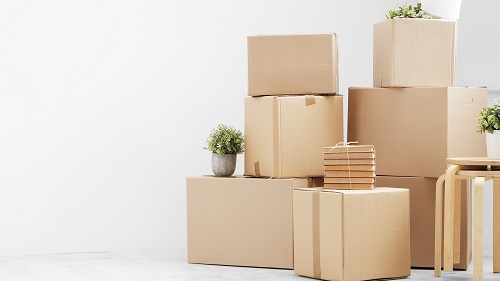5 Common Mistakes to Avoid When Fighting Weeds
Lawn care may feel like a chore, but we all know it is important and helps boost your home’s value. You may have a garden to tend to in addition to...
Manage your everyday finances with convenient accounts, flexible cards, and personalized service designed to fit your life.
At First Federal Bank, we offer flexible mortgage solutions for almost any situation, helping you secure the right financing for your dream home.
Business banking offers secure financial management, streamlined transactions, credit options, and tools to help businesses grow efficiently and sustainably.

 Few people can truly say they look forward to moving. Sure, there can be excitement about a new home or city. Fresh job opportunities. Being closer to family and friends. Exploring a place that is new to you. But the move itself can be anxiety inducing.
Few people can truly say they look forward to moving. Sure, there can be excitement about a new home or city. Fresh job opportunities. Being closer to family and friends. Exploring a place that is new to you. But the move itself can be anxiety inducing.
Many families move regularly. Some have got it down to a science. Few will admit they do so without stress. But the experts have some advice on ways you make the process easier:
Start planning as early as possible
Long before you put a single possession into a cardboard box, you have to plan out your move. And I really mean it—every aspect. This is more involved than you think, so start early and set aside a chunk of time. Shanaiqua D'Sa, a content marketing lead at Attick Self Storage, notes planning ahead is, "undoubtedly the first and most important step." It should include budgeting, comparing moving companies, considering if you need a storage unit to temporarily house your stuff, acquiring packing materials, and more…
Declutter before you move (or pack)
Multiple pros I spoke to made the same point, and it's worth repeating here: Declutter before your move so you don't waste money moving things you don't need or want to keep. In general, you should start this process a few weeks in advance of your move. Three or so weeks at least ensures that you have enough time to think about what you really need to keep, and to donate or sell what you don't. If something is broken or rarely used, consider leaving it behind as you move into a new phase of your life. A few weeks will give you time to actually list and sell things to make money for your move, but set a deadline for when you'll donate the remainder—you don't want junk lying around when the movers show up…
Pack like a pro, even if you can't pay for it
Like planning and decluttering, packing will start weeks before you move. I realize that's not always possible, but do try to start as soon as you can. Waiting until a few days before—or worse, the day the movers show up—can lead to chaos.
Movers can help you pack, but that's typically expensive. Evan Hock, co-founder of MakeMyMove cautions, "Packing always takes longer than expected, so start early, especially with seasonal items or belongings you don't use daily."
While you can likely score some free boxes from local businesses, it's a good idea to just buy them (you can usually find the best prices at big box hardware stores). Rimeris suggests purchasing high-quality tape, "markers you can actually read," and strong boxes, all of which are "worth every penny." Mindy Godding, president of the National Association of Productivity and Organizing Professionals, advises buying all your boxes so they're all similar shapes and sizes and will pack more easily. You can cut down your costs on protective supplies, Godding says, noting packing paper works just as well as bubble wrap or pre-made inserts when it comes to protecting your fragile items.
Do what you need to do online before you move
It's easy to get so wrapped up in the physical process of moving your possessions from one place to another that you can forget about what comes next: Living somewhere new. Especially if you are moving to a new town, you will have to check a bunch of boxes to get your new life up and running.
A lot of these things can be handled online, so do your research and accomplish as much as you can before your move. Start by making a list of all the different things to deal with at your current address. You may need to make some repairs to get your security deposit back if you’re a renter. Take stock of your bills and memberships: cancel your gym membership and any other local recurring charges, like public transit cards that auto-renew. Set up a mail forwarding so you will get any mail that comes to your old place. Cancel your utilities. Reach out to your doctor, dentist, optometrist, and other providers to find out if they can make referrals for you in your new area and provide copies of all your important records and documents. Forward your prescriptions to a new pharmacy.
Now, shift focus to your new location. Set up your utilities and the online accounts you'll need to pay them, switch your driver's license information if necessary, research the deadlines for re-registering your car, and contact your insurer (hopefully your new area will have lower rates). You can even start looking for local doctors, dentists, or any other professionals you'll need to avail yourself of in the short term after you move.
Stay on top of things the day of
The last step is the big one: It's time to move. Even this part still comes down to planning and budgeting. Jordan Sakala of laborhutt.com suggests moving during the week and mid-month, when demand is lower, and making sure you're ready and packed before the movers arrive. If you're not ready when they pull up, you could get charged an hourly fee while they either wait around for you or jump in to help speed things along. Make sure to tell movers about heavy furniture or tight squeezes in advance so they come with all the necessary tools, as if you don't, you may end up waiting around (and being charged for it) while they run to get them—or, worse, be told they can't move those things at all.
On moving day, even if you've hired a full-service moving team and outsourced pretty much everything, it's a good idea to stick around and supervise so you can answer any last-minute questions. There are some things movers won’t touch, so it will be your responsibility to coordinate their transport. Get a written list of what your company won't deal with in advance, but in general, expect to take care of your own jewelry, delicate valuables, identifying documents, medical papers and medications, hazardous materials, plants, and pets.
For more details on each of these tips, read the full article here.
Before walking out your door for the last time, check the place over, and make sure you know exactly where the essentials boxes you packed are. Once they're all accounted for, get on the road to your new home—hopefully feeling excited, instead of frazzled and exhausted.

Lawn care may feel like a chore, but we all know it is important and helps boost your home’s value. You may have a garden to tend to in addition to...

Bringing the outdoors in is a great way to add life, a touch of color, and a burst of brightness into your home. However, be careful before grabbing...

New technology can make life easier, and the rise of smart appliances simplifies so many aspects of daily living. From the way you cook to how you...
Manage your accounts, make payments, and more.
Open an account with us.